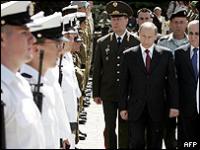







|
News and Information
Putin on historic visit to Israel
| April 28, 2005 |

Russian Putin and President Katzav (right) inspect Israeli troops in Jerusalem
The visit cements a dramatic turn in relations
Russian President Vladimir Putin - on a historic first trip to the Jewish state by a Kremlin leader - is holding talks with Israeli leaders in Jerusalem.
He has met President Moshe Katzav and is now holding talks with Prime Minister Ariel Sharon.
Mr Putin faced down Israeli objections over plans to sell arms to Syria and assistance to Iran's nuclear programme.
He said the arms were not a threat, but conceded that Iran's programme must be peaceful and internationally monitored.
Russia and Israel restored ties in 1991 but this visit marks a new phase in relations between the two countries.
His offer to host a regional peace conference has been greeted coolly by Israel and the US.
Palestinian officials welcomed the proposal.
Today there is a chance to end the long Israeli-Palestinian conflict. The key to the solution lies in continuing the dialogue
Vladimir Putin
Press give cautious welcome
Israel argues a conference would be premature because the international peace plan known as the roadmap has not yet got far enough.
It says the Palestinians have not fulfilled one of their first obligations, to dismantle militant groups. Israel is also behind on its obligations, including a freeze on settlement activity.
Milestone
Mr Putin began the trip to Jerusalem with an evening visit to two shrines, the Western Wall which is the holiest site in Judaism, and the Holy Sepulchre church, believed to be the site of Jesus' crucifixion.
Russian President Vladimir Putin at the Pyramids
Analysis: Russia's role
On Thursday morning he inspected an honour guard at Mr Katzav's residence and met Christian, Jewish and Muslim leaders.
After talks with Mr Katzav, whose role is largely ceremonial, the two men signed a statement pledging to strive for a "just, lasting and comprehensive settlement in the Middle East".
He told reporters that peace could be reached on the basis of the roadmap, the plan co-sponsored by Russia, the US, the UN and the European Union.
"Today there is a chance to end the long Israeli-Palestinian conflict. The key to the solution of this conflict lies in continuing the dialogue that started recently," he said.
However, Mr Putin did not reiterate his conference proposal.
The Russian president defended Moscow's planned sale of Strelets anti-aircraft missiles to Syria, saying they did not threaten Israel.
"The system we are going to supply to Syria is short-range and poses no threat whatsoever to Israeli territory," he said. "...We are not planning to do anything that would upset the balance of forces in the region."
Mr Putin added that he had blocked the Russian military from selling the longer-range Iskander missiles to Damascus.
Israel has expressed fears that missiles could fall into the hands of militant groups.
Meeting with Abbas
Mr Putin also said Russia was working to make sure Iran's nuclear capability was used only for peaceful means.
He said Iran should "abandon all technology to create a full nuclear cycle and also not prevent its nuclear sites from being placed under international control".
Mr Putin was also expected to discuss these matters with Mr Sharon, before travelling to Ramallah to meet Palestinian leader Mahmoud Abbas on Friday.
The visit to the West Bank will be another first for a Russian leader, and he will use it to lay a wreath at the grave of the late Palestinian Authority President Yasser Arafat.
The Palestinian envoy to Moscow has said Mr Putin will offer to sell 50 armoured vehicles during their talks - another deal opposed by Israel. |
Source: www.bbc.com |
| http://news.bbc.co.uk/2/hi/middle_east/4491425.stm |
|
| Support Caprivi Freedom |
Fill out the form below to become a member of this site and receive our regular newsletter.
|

|

